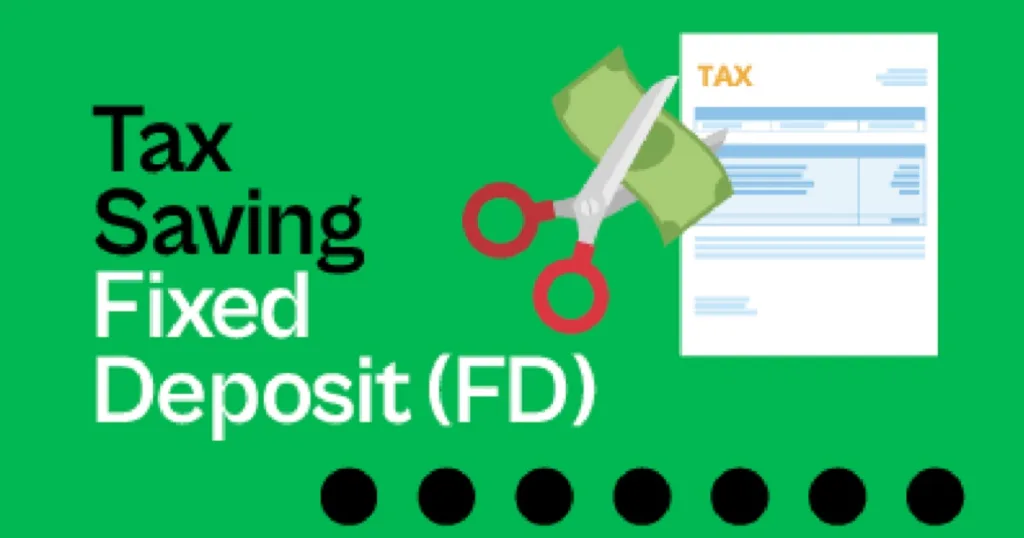For fixed deposit (FD) investors, earning high interest is only half the consideration. The interest earned on an FD is taxable. Hence, without proper tax planning, a large portion of your earnings could get eroded. This makes it critical to look at varied investment strategies and tax-saving methods on FDs.

Understand the tax implications of FDs and put in place smart tax-saving strategies. This could help ensure that the interest earned is reinvested or utilised to achieve a financial goal. Whether you’re employed, self-employed, or a retiree, a sound tax strategy could increase your returns.
Here’s a look at how you could save tax on interest earned from an FD:
Invest in Tax-saving Fixed Deposits
Many banks and NBFCs offer tax saving fixed deposits that qualify for deductions. This provision is available under Section 80C of the Income Tax Act, 1961. These tax-saving FDs allow you to claim a deduction of up to ₹1.5 Lakhs per financial year. Keep in mind that they have a lock-in period of five years.
The interest earned on these tax-saving fixed deposits is still taxable. But the deduction on the principal lowers your taxable income in that financial year by up to this amount. This translates into sizeable tax savings based on your income tax slab rates.
Choose Cumulative Option to Defer Tax
Most banks and NBFCs provide you with a choice of interest payout options on fixed deposits. These can be cumulative (interest at maturity) or non-cumulative (periodic payouts). For investors looking to save taxes in the short-term, the cumulative option can be a smart choice.
When interest accrues annually but is paid at maturity, you only have to pay taxes in that final year. This is when the cumulative interest income is credited to your account. This way, you could delay your tax liability for the entire FD tenor.
Consider a 5-year fixed deposit where the cumulative interest is over ₹5 Lakhs. Here, deferring taxes for this tenor could lead to short-term tax savings. This is in comparison to being taxed annually. Compounding further magnifies the cumulative interest amount over longer FD tenors.
Utilise Tax-free Limits
Check if your annual taxable income remains under the basic exemption limits. In this case, you may not have to pay any taxes on the interest income at all on FDs.
For senior citizens aged 60-80 years, the basic annual exemption limit is ₹3 Lakhs. However, for super senior citizens above 80, it goes up to ₹5 Lakhs. Those under 60 years have an annual exemption limit of ₹2.5 Lakhs for resident individuals.
Consider splitting FDs across family members. With this, you ensure each person’s interest income is under the exemption limits. This may help eliminate tax liability while complying with regulations.
Change Tenor to Lower Tax Impact
When investing in FDs, pick your tenors based on the expected interest income. In this case, you could opt for a shorter tenor that offers a lower interest rate. By doing so, you could avoid a higher Tax Deducted at Source (TDS) depending on the amount invested. For individuals below 60 years, interest income up to ₹40,000 per financial year from FDs is exempt from any TDS.
For senior citizens, the TDS exemption limit is even higher at ₹50,000 per fiscal year. Plan your FD investments with tenors and interest incomes below these slabs. With this, you could avoid deduction of tax at source. This may help you keep the full interest payout.
Leverage Senior Citizen Tax Benefits
Senior citizens aged 60 years and above can leverage higher tax benefits. This can help reduce their outgo on fixed deposit interest income. They could also claim a deduction on interest income from FDs, savings accounts, etc.
Interest up to ₹50,000 from sources like FDs is eligible for deduction from total taxable income for senior citizens. This provides an additional annual tax saving opportunity for those relying on FD interest for income. They could also browse tax-saving FD rates for better returns and to reduce tax liability.
Consult Tax Professionals
The core principles of smart FD tax planning are straightforward. However, implementing the optimal strategy can get complex. This is depending on your overall income profile, investment goals and tax slabs. This is where seeking professional tax advice can prove invaluable.
Qualified financial planners, chartered accountants, and tax consultants could study your unique situation. By doing so, they can provide customised recommendations. This includes suggesting ideal fixed deposit tenors, interest payout modes, and asset allocation. With this, they could help minimise your tax on FD income.
While FDs provide assured returns, their tax efficiency requires equal focus for investors. Utilise tax saving FDs, cumulative interest payout options, and more. With this, you could reduce the taxation on your FD interest income.
The key is to start tax planning well in advance based on your unique income levels and investment goals. Timely allocation, reinvestment, and compounding could maximise your long-term wealth creation. This is all while keeping FD interest taxes to a minimum.






Leave a Comment
You must be logged in to post a comment.